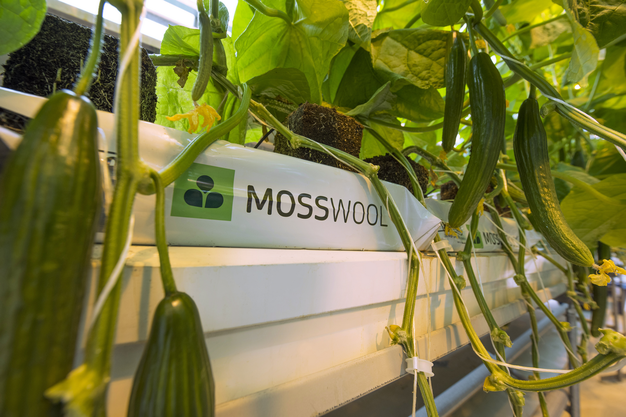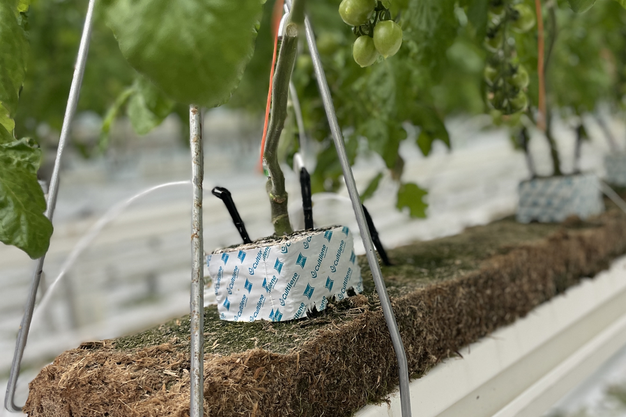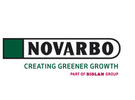Over the years, Novarbo Oy has been developing alternative substrates to enhance sustainability in the horticulture sector. Where the company has contributed to peat-free and circular growing, they now aim for nothing less than plastic-free growing. In 2020, this Finish company introduced its Mosswool slabs as an organic alternative to stonewool. Initially, this product consisted of a combination of sphagnum moss and peat. However, in light of upcoming peat bans, the company developed a completely peat-free substate. This soon-to-be RHP-certified substrate is made of 75% wood fiber and 25% acrotelm (the actively growing top layer of a bog). Now, the company is conducting trials with plastic-free Mosswool. "It's too early to make any final conclusions, but these trials look absolutely promising," says Pirita Luolamaa-Vollebregt of Novarbo Oy.

Novarbo Oy's Mosswool substrate
Sphagnum moss substrates
Mosswool is considered to be a sustainable alternative for peat as it is made of sphagnum moss and wood fiber. "Acrotelm is the top layer of a bog which consists of bog flora such as Sphagnum mosses. After harvesting, Spaghnum moss will regrow rather quickly, with re-harvesting being possible in about 30 years. For this reason, Spaghnum moss is more sustainable than peat. Moreover, after usage, Mosswool can be locally composted together with crop residues. Or it can be recycled which minimizes disposal costs while providing raw material for new substrates like grow bags for consumers. Novarbo Oy's sphagnum moss is harvested using a patented ecological method called the Light Sphagnum Removal technique (LSR technique). This technique always leaves a part of the area unharvested to enable the regrowth of the vegetation. And we don't collect from protected sites or natural state bogs," Pirita explains. She adds: "Ultimately, we aim to allow for peat-free and plastic-free growing. Since plastic-free substrates for hydroponics don't yet exist, it would be groundbreaking if our trials with plastic-free substrates would be successful."
Tomato trials in Agrotopia
Since last year, Novarbo Oy has been trialing these plastic-free substrates. In the Agrotopia research center in Belgium, tomato crops are on 4 different Mosswool substrates: Peat-containing Mosswool with and without plastic and peat-free Mosswool with and without plastic. This trial started in 2023, in week 43, and will last until August 2024. The plastic-fee and peat-free version of the substrate is also on display in Tomatoworlds' greenhouse in Honselersdijk (the Netherlands). Pirita elaborates on the plastic-free substrate, saying: "It seems like it's very dry, but that's only what you see on the outside. The inner part perfectly absorbs moisture. It functions like a sponge and a buffer, which facilitates irrigation and fertilization. Indeed, the substrate is very dry on the outside, but that's quite beneficial because it helps to prevent excessive algae growth." She also wants to tackle the idea that plastic-free substrates prevent root growth: "Unlike what's often thought, plastic is not needed to block the light outside of the slab so that the roots can grow properly. This has already been shown in previous trials." She also highlights that the plastic-free substrates are not only suitable for tomatoes: "It can also be used for cucumbers and bell peppers; we have customers who use them for strawberries. The substrates are suitable for almost any crop that can grow on slabs or grow bags."

Novarbo Oy's plastic-free and peat-free Mosswool substrate in Tomatoworl (Honselersdijk, the Netherlands)
Ongoing developments
Since January 2023, Novarbo Oy has also carried out tests with cucumber plants in the Research Station for Vegetable Production in Sint-Katelijne-Waver (Belgium). "For this trial, we use substrates that solely consist of wood fiber. Although these trials don't yet involve plastic-free substrates, Pirita doesn't rule out the possibility that this substrate will also become plastic-free. This trial is expected to end in late April 2024. She adds: "We would also like to see if we can use the substrate for more than 1,5 years. Until now we haven't used it any longer, but it would be great if someone could test it for more than 1,5 years. We expect that the substrate can be used at least for up to two years," she continues. This summer Novarbo Oy will start a pilot project in cooperation with Lensli Substrates to expand the number of Novarbo Oy's organic, (peat-free) products on offer.
For more information:
Novarbo Oy
Lauttakyläntie 57
27510 Eura, Finland
Tel.: (02) 5491 680
Fax: (02) 5491 660
Email: [email protected]
novarbo.fi
